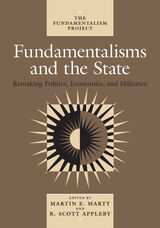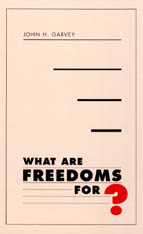
successful have they been in remaking political structures?
To answer this question, the contributors to this volume—
political scientists, historians of religion,
anthropologists, and sociologists—discuss the anti-
abortion movement, Operation Rescue in the United States, the
Islamic war of resistance in Afghanistan, Shi'ite
jurisprudence in Iran, and other issues. The volume
considers the effect that antisecular religious movements
have had over the past twenty-five years on national
economies, political parties, constitutional issues, and
international relations on five continents and within the
traditions of Islam, Christianity, Judaism, Buddhism,
Hinduism, and Sikhism. Marty and Appleby conclude with a
synthetic statement on the fundamentalist impact on polities,
economies, and state security.
The Fundamentalism Project, Volume 3
Martin E. Marty and R. Scott Appleby direct the
Fundamentalism Project. Marty, the Fairfax M. Cone
Distinguished Service Professor of the History of Modern
Christianity at the University of Chicago, is the senior
editor of the Christian Century and the author of
numerous books, including the multivolume Modern American
Religion, also published by the University of
Chicago Press. Appleby, a research associate at the
University of Chicago, is the author of “Church and
Age Unite!” The Modernist Impulse in American
Catholicism.

We generally suppose that it is our right to freedom which allows us to make the choices that shape our lives. The right to have an abortion is called "freedom of choice" because, it is said, a woman should be free to choose between giving birth and not doing so. Freedom of speech protects us whether we want to salute the flag or burn it. There is a correlative principle: one choice is as good as another. Freedom is not a right that makes moral judgments. It lets us do what we want.
John Garvey disputes both propositions. We should understand freedom, he maintains, as a right to act, not a right to choose; and furthermore, we should view freedom as a right to engage in actions that are good and valuable. This may seem obvious, but it inverts a central principle of liberalism--the idea that the right is prior to the good. Thus friendship is a good thing; and one reason the Constitution protects freedom of association is that it gives us the space to form friendships.
This book casts doubt on the idea that freedoms are bilateral rights that allow us to make contradictory choices: to speak or remain silent, to believe in God or to disbelieve, to abort or to give birth to a child. Garvey argues that the goodness of childbearing does not entail the goodness of abortion; and if freedom follows from the good, then freedom to do the first does not entail the freedom to do the second. Each action must have its own justification. Garvey holds that if the law is to protect freedoms, it is permissible--indeed it is necessary--to make judgments about the goodness and badness of actions.
The author's keen insights into important rights issues, communicated with verve and a variety of both real and hypothetical cases, will be of interest to all who care about the meaning of freedoms.
READERS
Browse our collection.
PUBLISHERS
See BiblioVault's publisher services.
STUDENT SERVICES
Files for college accessibility offices.
UChicago Accessibility Resources
home | accessibility | search | about | contact us
BiblioVault ® 2001 - 2024
The University of Chicago Press









